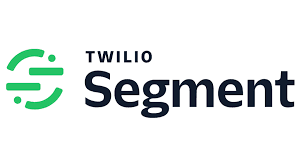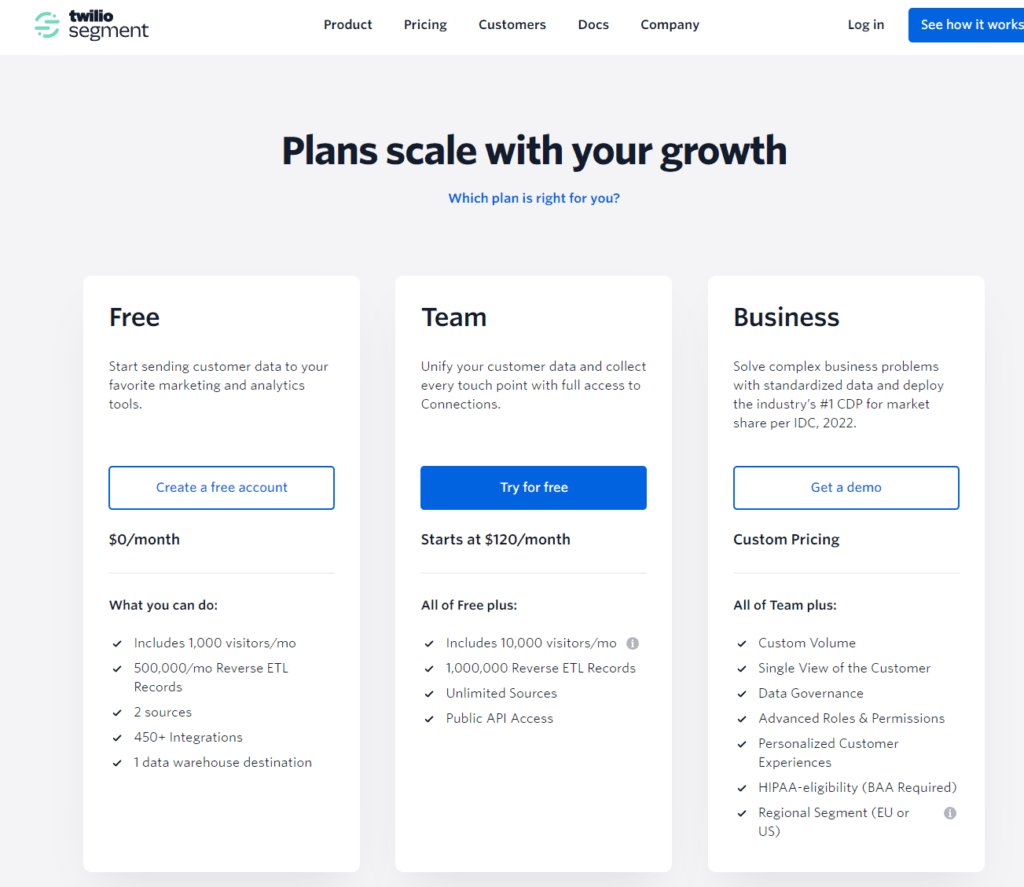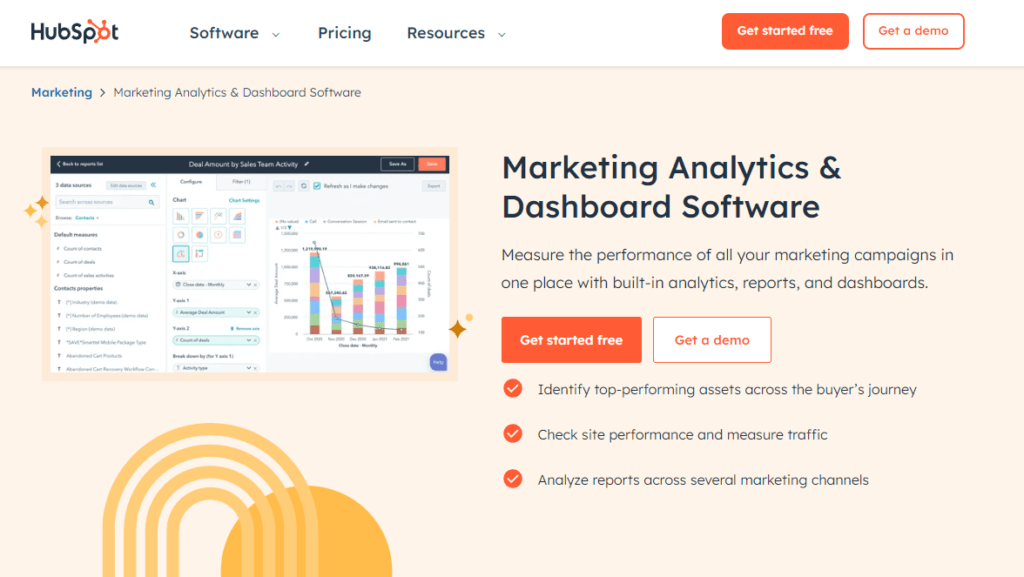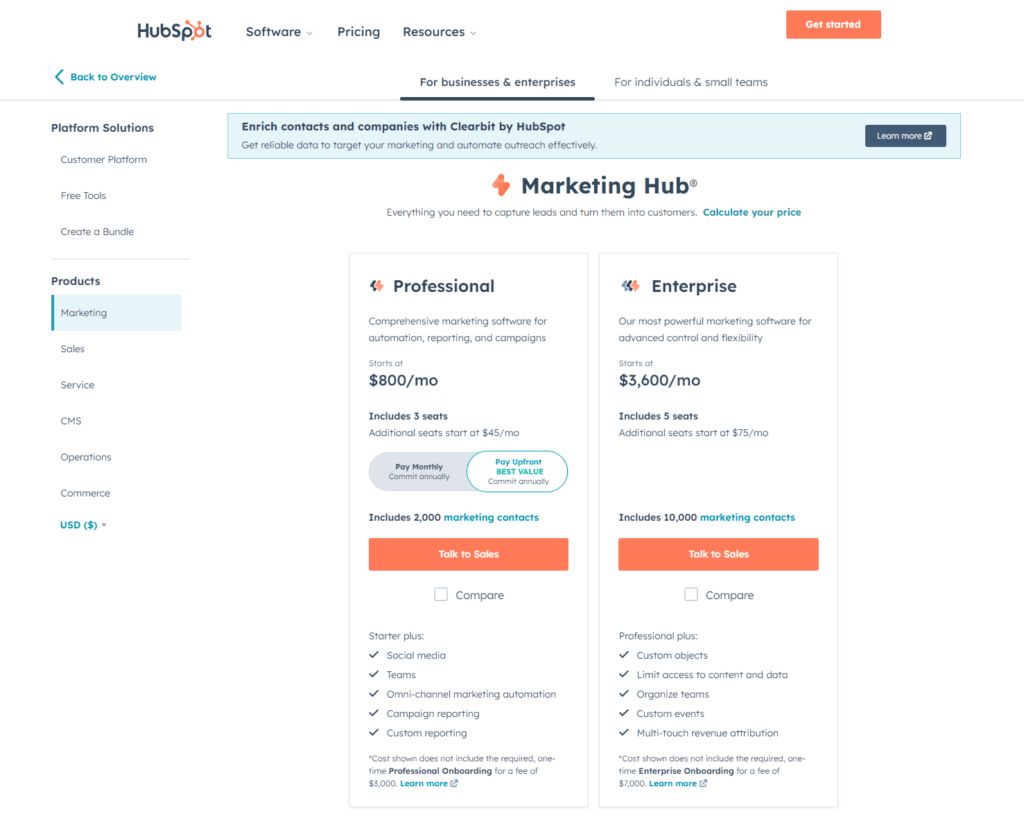In the bustling digital marketplace, the right analytics tool is more than just a convenience—it’s the compass that guides your marketing strategies towards success. Segment and HubSpot Marketing Analytics stand out as two leading lights in this arena, each offering a unique set of features designed to illuminate the path forward. Whether you’re a startup looking to understand your audience better or a seasoned enterprise aiming to refine your marketing efforts, choosing between Segment and HubSpot Marketing Analytics can significantly influence your approach to data-driven decision-making. Let’s delve into a key area of comparison that often sways the decision for many businesses: Integration Capabilities.
Segment | HubSpot Marketing Analytics |
|---|---|
| G2 Score – 4.6 out of 5 stars | G2 Score – 4.4 out of 5 stars |
| TrustRadius Score – 8.3/10 | TrustRadius Score – 8.5/10 |
Integration Capabilities
In today’s digital ecosystem, an analytics tool’s ability to integrate seamlessly with other platforms and services is paramount. It enhances the tool’s utility by providing a more comprehensive view of customer interactions and marketing effectiveness.
Segment: The Integration Powerhouse
Segment specializes in being the ultimate data hub for your tech stack. Its primary strength lies in its vast array of integrations, boasting connections with over 300 tools and services. This extensive network allows Segment to collect, unify, and channel your customer data to various analytics, marketing, and data warehousing tools without the need for individual integrations for each one.
For businesses utilizing a wide array of platforms across their marketing and sales efforts, Segment offers unparalleled flexibility. It acts as the central nervous system of your tech stack, ensuring data flows smoothly and consistently across all channels. This capability is especially beneficial for companies looking to tailor their stack to specific needs without being locked into a single ecosystem.
HubSpot Marketing Analytics: The All-In-One Solution
HubSpot Marketing Analytics, part of the broader HubSpot ecosystem, offers a different approach. While it might not match Segment in terms of sheer number of integrations, it provides deep, native integration within all HubSpot offerings, including CRM, email marketing, content management, and customer service tools. This integration ensures that all your marketing efforts are not only tracked but also leveraged to create a cohesive, unified marketing strategy.
HubSpot’s strength lies in its all-in-one nature, providing businesses with a comprehensive suite of tools that work seamlessly together. For companies looking for a straightforward, integrated solution without the need for managing multiple integrations, HubSpot offers simplicity and effectiveness. The platform is particularly appealing to small and medium-sized businesses seeking an easy-to-use, integrated marketing solution.
User Segmentation and Behavioral Analytics
The ability to segment users accurately and analyze their behavior is key to crafting personalized marketing strategies that resonate with your audience. Here’s how Segment and HubSpot Marketing Analytics approach user segmentation and behavioral analytics.
Segment: Advanced Segmentation for Customized User Insights
Segment’s architecture is designed around collecting and routing user data, making it exceptionally powerful for detailed user segmentation and behavioral analytics. It allows you to define segments based on a wide variety of criteria, drawing from the rich, unified user data it collects across your entire tech stack. This capability enables deep dives into user behavior, preferences, and interactions across multiple touchpoints.
Moreover, Segment’s strength in this area is amplified by its integrations, allowing for the enriched data to be utilized across analytics and marketing platforms for comprehensive analysis and targeted campaign execution. This level of detailed segmentation and behavioral insight is ideal for businesses looking to implement highly personalized marketing strategies based on nuanced understanding of their audience.
HubSpot Marketing Analytics: Integrated Behavioral Analytics Within the Marketing Funnel
HubSpot Marketing Analytics provides robust tools for user segmentation and behavioral analytics within the context of its integrated marketing suite. By leveraging data from its CRM and various marketing tools, HubSpot enables businesses to segment their audience based on interactions with emails, content, and the website itself, as well as CRM attributes.
HubSpot’s analytics tools are designed to give a clear view of how different segments move through the marketing funnel, identifying key behaviors that lead to conversion. This integrated approach to segmentation and behavioral analytics is particularly valuable for businesses focusing on inbound marketing strategies, allowing for the creation of targeted content and campaigns that engage users at each stage of their journey.

Related: Check out our free SEO suite

Data Collection and Management
The foundation of any successful marketing strategy is robust data collection and management. How Segment and HubSpot approach this task can significantly impact their suitability for your business. The ability of an analytics platform to accurately collect, manage, and make sense of data determines its effectiveness in driving informed decisions.
Segment: Specialized in Data Collection and Integration
Segment’s core functionality revolves around its sophisticated data collection and management capabilities. Designed as a customer data platform (CDP), it excels in collecting data from various touchpoints across the customer journey and unifying this information into a single, coherent customer view. This process involves aggregating data from websites, mobile apps, servers, and cloud applications, ensuring comprehensive coverage.
The platform’s strength lies in its ability to serve as a central hub for data collection before distributing this information to other tools for analysis, marketing automation, and customer relationship management. Segment’s focus on data integrity and consistency makes it an invaluable tool for businesses prioritizing accurate, cross-channel customer insights to tailor their marketing strategies effectively.
HubSpot Marketing Analytics: Integrated Data for a Unified Marketing View
HubSpot Marketing Analytics, embedded within the broader HubSpot platform, takes a slightly different approach to data collection and management. It focuses on gathering data from interactions within its ecosystem, including website visits, email engagements, social media interactions, and CRM activities. This integrated approach ensures that data from different marketing channels is automatically collected and aligned, providing a unified view of the customer journey.
HubSpot’s analytics tools then leverage this integrated data to offer insights into marketing performance, customer behavior, and conversion pathways. The advantage here is the seamless nature of data collection and analysis within a single platform, making it easier for businesses to manage their data and derive actionable insights without dealing with data silos.
Customization and Flexibility
The degree to which you can customize your analytics environment and its flexibility in adapting to different marketing approaches can significantly influence its effectiveness and utility. This facet explores how each platform allows users to tailor the analytics experience to their unique business needs and the flexibility it offers in adapting to various marketing strategies.
Segment: Highly Customizable Data Infrastructure
Segment offers a high level of customization, primarily through its robust data infrastructure that can be tailored to collect and distribute data based on very specific criteria. The platform allows users to define exactly what data is collected, how it’s structured, and where it’s sent, providing a great deal of control over the analytics process. This capability is particularly beneficial for businesses with unique data needs or those that operate across multiple platforms and require precise data handling.
Moreover, Segment’s flexibility extends to its integrations, enabling users to choose from a wide array of tools for further analysis, marketing automation, or customer engagement, depending on their specific needs. This makes Segment a powerful choice for businesses looking for a customizable and flexible data foundation to support diverse marketing strategies.
HubSpot Marketing Analytics: User-friendly Customization within an Integrated Platform
HubSpot Marketing Analytics offers customization mainly through its user-friendly dashboard and reporting tools, which allow users to create custom reports and visualize data according to their marketing goals. While it may not offer the same level of deep data customization as Segment, HubSpot excels in providing a flexible, integrated analytics experience that caters to a broad range of marketing activities.
The flexibility of HubSpot lies in its all-in-one platform, which seamlessly combines data from various marketing channels—email, social media, CRM, and more—into a cohesive analytics view. This integration simplifies the customization process, as users can easily pull in data from different sources within the HubSpot ecosystem to create comprehensive reports and dashboards.
User Segmentation and Behavioral Analytics
The capability to segment users based on their behaviors and interactions, and to analyze those segments for patterns and trends, is invaluable for crafting targeted, impactful marketing campaigns. This aspect evaluates how each platform allows marketers to dissect their audience into meaningful segments and analyze behaviors to drive more personalized and effective marketing strategies.
Segment: Advanced Segmentation for Personalized Customer Journeys
Segment, true to its name, excels in user segmentation and behavioral analytics. It provides robust tools for defining and analyzing customer segments based on a wide array of behaviors and characteristics. By collecting data across every touchpoint in the customer journey, Segment allows marketers to create highly detailed segments that can be used to personalize marketing efforts at scale.
Furthermore, Segment’s behavioral analytics capabilities are designed to uncover deep insights into how different segments interact with your product or website, identifying opportunities for optimization and personalization. This level of analysis is crucial for businesses focused on delivering highly personalized customer experiences and for those looking to understand the nuances of customer behavior across multiple channels.
HubSpot Marketing Analytics: Integrated Segmentation within the Marketing Funnel
HubSpot Marketing Analytics offers segmentation capabilities that are deeply integrated with its marketing and CRM tools, allowing for seamless creation and management of user segments based on interactions within the HubSpot ecosystem. This integration makes it easy for marketers to segment audiences based on email engagement, website visits, content interactions, and more, directly tying these segments to marketing campaigns and activities.
While perhaps not as granular as Segment’s capabilities, HubSpot’s segmentation is incredibly user-friendly and effective for businesses utilizing the HubSpot suite for their marketing efforts. The platform’s behavioral analytics tools also provide insights into how segments convert at different stages of the marketing funnel, enabling marketers to tailor strategies to improve conversion rates and customer retention.
Pricing
Segment:

HubSpot Marketing Analytics:


Conclusion
In wrapping up our comprehensive comparison between Segment and HubSpot Marketing Analytics, we’ve journeyed through several critical areas that distinguish these analytics powerhouses. From integration capabilities and data collection methods to customization options, user segmentation, and behavioral analytics, each platform offers unique strengths designed to cater to various business needs and marketing strategies.
Segment shines as a specialized platform that excels in data integration, advanced segmentation, and behavioral analytics. Its ability to act as a central data hub, collecting and distributing information across a vast array of tools and services, makes it an ideal choice for businesses with complex data ecosystems. Segment’s advanced customization and segmentation capabilities allow for deep, data-driven insights, empowering businesses to craft highly personalized customer experiences and sophisticated marketing strategies.
HubSpot Marketing Analytics, on the other hand, stands out for its integrated approach within the broader HubSpot ecosystem. Offering seamless data collection and management across marketing, sales, and customer service tools, HubSpot provides a unified view of the customer journey. Its user-friendly segmentation and analytics tools, coupled with an extensive suite of marketing capabilities, make it a compelling choice for businesses looking for an all-in-one solution. HubSpot’s platform is especially beneficial for small to medium-sized businesses aiming to streamline their marketing efforts and enhance their overall marketing effectiveness with minimal complexity.
Read Next:
- GetResponse vs Zoho Campaigns: The Best Email Marketing Tool for 2024
- AWeber vs ActiveCampaign: The Best Email Marketing Tool
- Constant Contact vs Campaigner: Best Email Marketing Tool
- GetResponse vs Omnisend: The Best Email Marketing Tool for 2024
- AWeber vs Benchmark Email: The Best Email Marketing Tool





















